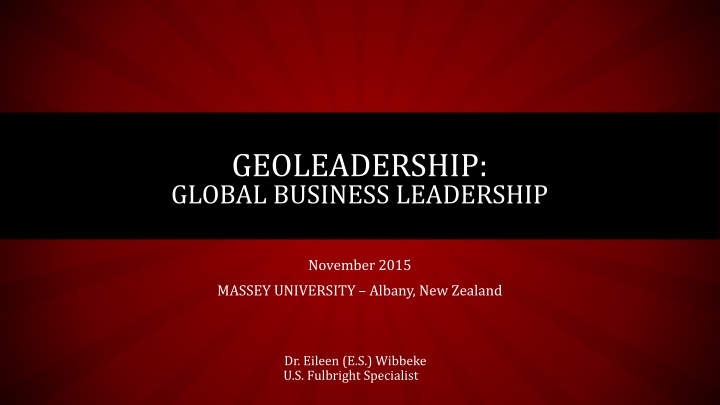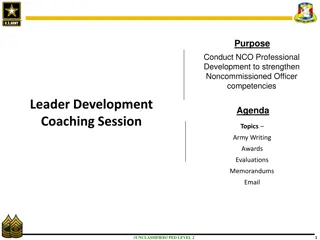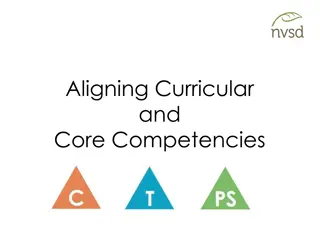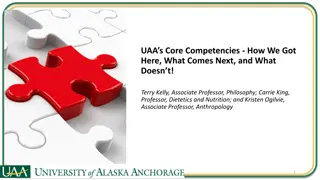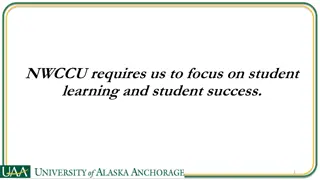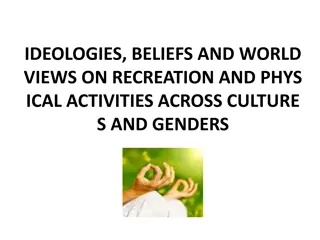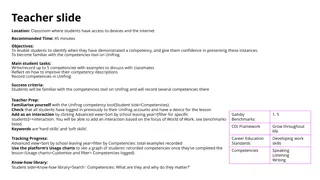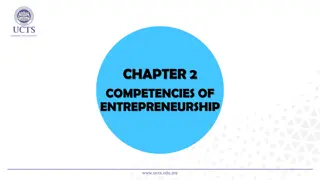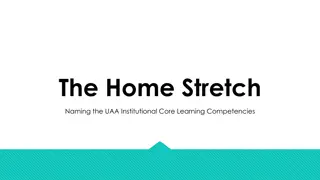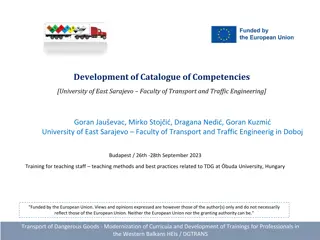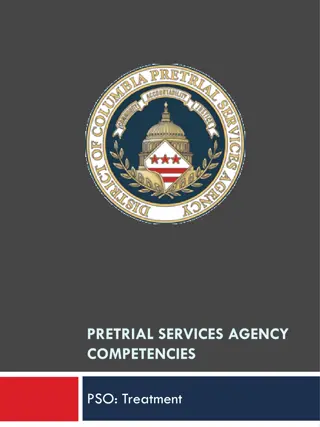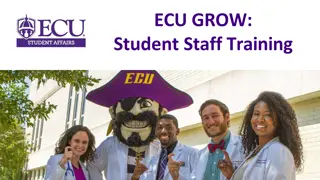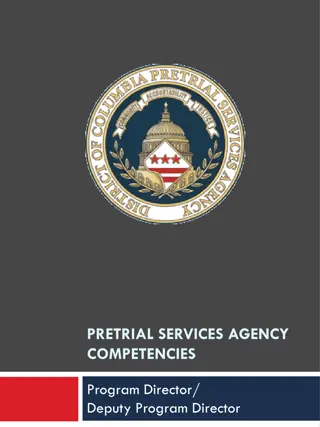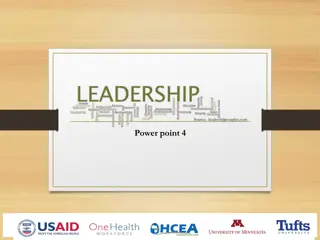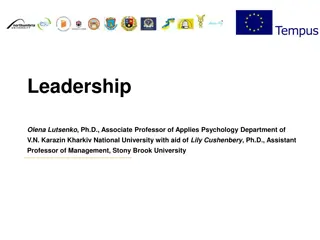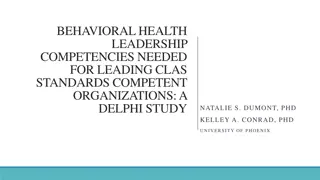GeoLeadership Competencies: Effective Leadership Across Cultures
Geoleadership Model highlights seven competencies essential for global leaders to navigate cross-cultural challenges effectively. Dr. Eileen Wibbeke, a renowned cross-cultural consultant, emphasizes the importance of capability, care, change, communication, consciousness, context, and contrasts in leadership. The model, illustrated in the first edition of Global Business Leadership, provides a framework for leaders to excel in today's diverse business landscape.
Download Presentation

Please find below an Image/Link to download the presentation.
The content on the website is provided AS IS for your information and personal use only. It may not be sold, licensed, or shared on other websites without obtaining consent from the author.If you encounter any issues during the download, it is possible that the publisher has removed the file from their server.
You are allowed to download the files provided on this website for personal or commercial use, subject to the condition that they are used lawfully. All files are the property of their respective owners.
The content on the website is provided AS IS for your information and personal use only. It may not be sold, licensed, or shared on other websites without obtaining consent from the author.
E N D
Presentation Transcript
GEOLEADERSHIP: GLOBAL BUSINESS LEADERSHIP November 2015 MASSEY UNIVERSITY Albany, New Zealand Dr. Eileen (E.S.) Wibbeke U.S. Fulbright Specialist
ABOUT DR. WIBBEKE Dr. E.S. (Eileen Sheridan) Wibbeke holds a BA in International Relations, an MBA in International Management, and Doctorate in Management (Organizational Leadership). Cross-cultural consultant to individuals and organizations for over two decades; one decade spent in Silicon Valley (i.e. Borland, Novell, Siebel Systems). Brick and mortar and online course instruction at UC Santa Cruz, University of Liverpool and other international institutions for 14 years. Students logging in for lectures from more than 156 countries currently. Fluent in English and Spanish; studied German, Italian and Japanese. Dual citizenship with U.S. and Republic of Ireland. Studied abroad in Costa Rica, Nicaragua, and Spain. 2
A MOMENT FOR WARREN BENNIS CONTRIBUTION BY WARREN BENNIS We were honored to have had Warren contribute the Foreword for the second edition of Global Business Leadership (2014). Warren received the Lifetime Achievement Award from ILA in 2008. Warren stated that Authors Wibbeke and McArthur stretch us beyond our borders and into a reality where mastery of business, culture, and leadership is no longer a "nice to have , it is a must have! 3
CONTRIBUTION BY EDGAR SCHEIN We were pleased to have Professor Edgar Schein, formerly of MIT, contribute to the second edition of Global Business Leadership (GBL). Contributed information from his book, Organizational Culture and Leadership 4e to Chapter 9 of Global Business Leadership 2e The Principle of Capability . 4
GLOBAL BUSINESS LEADERSHIP Wibbeke, E. (2008). Global Business Leadership (1st ed.) . Oxford, UK: Routledge. Wibbeke, E., & McArthur, S. (2014). Global Business Leadership (2nd ed.). Oxford, UK: Routledge. 5
A MOMENT FOR WARREN BENNIS TWO BOOK EDITIONS In the first edition, we concentrated on explaining the Geoleadership Model and utilized case studies. In the second edition, we concentrated on interviews with thought leaders and what they thought of the Geoleadership Model Where in the world is your GEOLEADER? 6
GEOLEADERSHIP MODEL - FIRST EDITION Geoleadership Model: The Seven Competencies Required of a Geoleader Capability Care Change Communication Consciousness Context Contrasts Each competency is key in being an effective leader across cultures in this era of rapid globalization. Leadership and culture are inextricably linked. Both are about relationships, resources, and respect. 7
GLOBAL BUSINESS LEADERSHIP - CAPABILITY Intercultural capability at all organizational levels Capability Defined: Intercultural competence requires leaders that are able to their own and others capability and build it where there is deficit. ? 8
GLOBAL BUSINESS LEADERSHIP CARE Enhanced interests and value for profit and stakeholders Care defined: Sensitivity , concern and appreciation for other cultures are primary requirements for the new intercultural leaders we call this the principle of Care. Leaders can improve both and intercultural relations by adopting sustainable view of business strategy. 9
GEOLEADERSHIP - CHANGE Self-awareness of own culture background and basis Change is not a natural human condition. Change defined: In order for a leader to be a brilliant visionary and an adroit communicator, the leader must be able to scan be disruptive of current forces in order to imagine a compelling future 10
GEOLEADERSHIP MODEL COMMUNICATION Engaged operations and interactions with diverse cultures Communication defined: The essential message here is that you must connect from other to understand them. To understand people who are difference from us, we must engage in meaningful communication. For the intercultural leader this means developing a general understanding of how communication works. 11
GEOLEADERSHIP - CONSCIOUSNESS Situational perspective with no judgment Consciousness Defined: We live in a changing global culture in which there are two driving and ostensibly forces, one is globalization, and the other is the counter-globalization fueled by political and religious factions. No one is sure what globalization will lead to; however, most authorities and theorists believe that globalization will continue. Is there any industry in any country of the world that has not been touched by globalization? 12
GEOLEADERSHIP - CONTEXT Cultural differences in leading and motivating followers Context Defined: Global leaders must develop the ability to perceive, discern, and adapt to the situations within which they work, and to suspend judgement. Leaders need to understand each culturally learned behavior in the context of where that behavior originates and appears. Remember that the context of a situation gives way to situational leadership almost in all ways. 13
INTERVIEWEES FOR SECOND EDITION INTERVIEWEE TITLE CEO, CCL INTERVIEWEE George Mitchell TITLE Attorney, Envoy John Ryan Fons Trompenaars Intercultural Consultant Jean-Christophe Bas UN Strategist Sally Helgesen Author Michael Dukakis Gov. Massachusetts Geert Hofstede Professor Emeritus Garry Ridge CEO. WD40 Irwin Jacobs Founder, Qualcomm Harry Triandis Psychology Prof. Alan Richter George Simons Consultant, QED Intercultural Consultant Linda Sharkey Ulzii Vangansuren Consultant Mgmt Prof-Mongolia Todd Fortner Auto Executive in China Marye Anne Fox Fmr Chancellor UCSD Jim Kouzes Leadership Author Jane Roberts 34 Million Friends- UN VP Global Pymts,Google CEO, ResMed Marshall Goldsmith Maya Hu-Chan Executive Coach Osama Bedier Leadership Consultant Peter Farrell Alain Barbier Interpol Rep. to European Union CEO, ViaSat Tom Carson CEO,Rovi Corp Mark Dankberg 14
GLOBAL BUSINESS LEADERSHIP SECOND EDITION First finding: Cultures vary widely in how they view business including how to lead and how to follow. Even with the minimal understanding of cultural differences that can be learned through distant study, the going can be tough and frustrating. 15
GLOBAL BUSINESS LEADERSHIP Second finding: Combination of globalization, complex societal changes, demographic changes, and the lack of skilled business leaders being graduated from business schools has created a global talent crisis. 16
GLOBAL BUSINESS LEADERSHIP Third Finding: There is no right or wrong culture, just different cultures. Differing types of economies also exist, including knowledge economy and creativity economy. Intellectual capital resides in the brainpower of employees. Culture shapes the image of the ideal of a particular nation or organization. https://www.youtube.com/watch?v=qHwMg-kYLEk 17
GEOLEADERSHIP CHALLENGES INTERVIEW: John Ryan, CEO, Center for Creative Leadership Question: What are the most important decisions you make as a leader of an organization of which you have been a part? Answer: Leaders need to make the right decisions in three key areas. No. 1 is setting direction, which means developing a realistic and competitive strategy. No. 2 is creating alignment. This is not about merely organizing people, which is instead the role of management. It s more about establishing effective communication up, down and across the organization to foster empowerment. No. 3 is prioritizing talent decisions. It is crucial to hire well, ensure everyone is in the right position and give individuals and teams the resources to execute strategy. This might sound trite, but so few leaders give talent the focus it deserves. 18
CULTURE AND LEADERSHIP INTERVIEW: Geert Hofstede, Professor Emeritus Power Distance Question: What is the biggest challenge facing global business leaders today in corporations? Masculinity versus Feminity Individualism versus Collectivism Answer: The biggest challenge is becoming a victim of greed. Long-Term versus Short-Term Orientation Uncertainty Avoidance 19
COMMUNICATION INTERVIEW: Jim Kouzes, co-author of The Leadership Challenge Question: What is the biggest challenge facing global business leaders today? Answer: The biggest challenge global business leaders face today is trust. Virtual trust is very difficult to establish. For people to feel fully confident in their leaders, they have to have some interpersonal interaction with them. While social media has enabled leaders to communicate more quickly and more deeply with people than ever before, we are much more likely to trust our leaders if we see them face- to-face. 20
CAPABILITY INTERVIEW: Ulziibayaar Vangansuren Professor at National Academy of Governance (Mongolia) Question: What effect do you think national culture has on business leadership decision- making? (This can also include how your own native national culture affects your decision-making) Some cultural aspects that have an effect on decision making are nepotism, corruption, and cultural biases (stereotypes, prejudices, religious beliefs, etc.) pertinent to that culture. In Mongolia, for example, most business leaders consult with Buddhist monks prior to setting launch dates for important business activities, such as grand openings of buildings/branches. They are guided by their religious belief that there are good days for certain activities and rituals. Also in Mongolia, nepotism is seen in the relations of extended family members, classmates/school ties, political affiliations, and people from the same province or people sharing the same birthplaces. These relationships sometimes affect the leaders decisions. 21
CULTURAL COMPETENCE THE BOTTOM LINE Humans are quite similar as beings in some ways; however, as cultures we vary widely in our worldview. Everything we do is influenced by cultural norms. This includes how we both conduct and lead businesses globally. 22
ADDITIONAL CHAPTERS Gender and Leadership Technology and Leadership Geoleadership in the Community Interesting video: https://www.youtube.com/watch?v=57KW6RO8Rcs 23
CULTURAL COMPETENCE - GEOLEADERSHIP VIDEO: https://www.youtube.com/watch?feature=player_de tailpage&v=Uj56IPJOqWE Q& A CONTACT: Dr. Eileen Wibbeke docwibbeke@gmail.com 24
Go here to get a copy of the PDF of the Geoleadership Model: http://geoleadership.com/model.asp You can also email me if you would like a copy of these slides You can contact me at: Dr. E.S. Wibbeke 3104 Via Amata San Diego, CA 92111 USA docwibbeke@gmail.com
